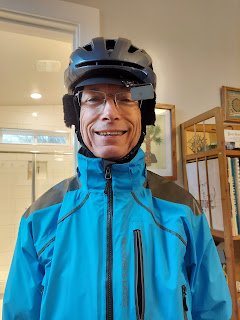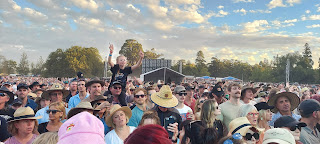Reading recommendations; Wendell Berry
 |
| Monoculture in south central Louisiana. Sugarcane in April |
Time is told by death, who doubts it? But time is always halved- for all we know it is halved- by the blink, the synapse, the immeasurable moment of the present. Time is only the past and maybe the future; the present moment, dividing and connecting them, is eternal. The time of the past is there, somewhat, but only somewhat, to be remembered and examined. We believe that the future is there too, for it keeps arriving, though we know nothing about it. But try to stop the present for your patient scrutiny, or to measure its length with your most advanced chronometer. It exists, so far as I can tell, only as a leak in time through which, if we were quiet enough, eternity falls upon us and makes its claim. And here I am, an old man traveling as a child among the dead. We measure time by its deaths, yes, and by its births. For time is also told by life. As some depart, others come. A hand open in farewell remains open in welcome. Like the flowing river that is yet always present, time that is always going is always coming. And time that is told by death and birth is held and redeemed by love, which is always present. Time, then, is told by loves losses, and by the coming of love, and by love continuing in gratitude for what is lost. It is folded and enfolded and unfolded forever and ever, the love by which the dead are alive and the unborn welcomed into the womb. The great question for the old and the dying, I think, is not if they have loved and been loved enough, but if they have been grateful enough for the love received and given, however much".
Tyler comments that Berry "effectively transports the reader into his world which is one of simplicity, old values, familial connection, stewardship, living off the land, and a sense of spiritual well-being".
The Poetry Foundation had a great summary of Wendell Berry and his writings. Here are some excerpts from it:
In his (Berry's) opinion, many environmentalists place too much emphasis on wild lands without acknowledging the importance of agriculture to our society. Berry strongly believes that small-scale farming is essential to healthy local economies, and that strong local economies are essential to the survival of the species and the well-being of the planet.
Dictionary of Literary Biography contributor Leon V.
Driskell termed The Unsettling of America "an apocalyptic book that places
in bold relief the ecological and environmental problems of the American
nation."
Charles Hudson, writing in the Georgia Review, noted that, “like
Thoreau, one of Berry's fundamental concerns is working out a basis for living
a principled life. And like Thoreau, in his quest for principles Berry has
chosen to simplify his life, and much of what he writes about is what has
attended this simplification, as well as a criticism of modern society from the
standpoint of this simplicity."
Considering Berry's body of work, Charles Hudson pointed out
the author's versatility and commended him for his appreciation of the plain
things in life. "In an age when many writers have committed themselves to
their 'specialty'—even though doing so can lead to commercialism, preciousness,
self-indulgence, social irresponsibility, or even nihilism—Berry has refused to
specialize," Hudson wrote in the Georgia Review. "He is a novelist, a
poet, an essayist, a naturalist, and a small farmer. He has embraced the
commonplace and has ennobled it."
Years ago, I read some of Berry's essays from Recollected Essays, 1965-1980. I felt as Kingsnorth notes in his introduction to The World-Ending Fire, that this man does not do anything lightly, and that he chooses his words as carefully as his actions. I have started my journey through this new collection. As all of us know, reading is a profound joy and yet the height of our bedside stack of unread or partially read books and our table and desktops strewn with newsletters and magazines give us pause to add more. And yet, spending time with Wendell Berry will be unequivocally good for you, whether it be in the world of Port William or within the depths of his essays. So I recommend piling it on (or digging it out of your collection and dusting it off), even just a single novel or some essays. Goodreads notes that Andy Catlett: Early Travels is a perfect introduction to the world of Port William, even though it is the 8th book in the series. And one could start anywhere reading his essays.
David Rains Wallace observed in the San Francisco Review of Books: "There's no living essayist better than Wendell Berry. His prose is exemplary of the craftsmanship he advocates. It's like master cabinetry or Shaker furniture, drawing elegance from precision and grace from simplicity."
"To cherish what remains of the Earth and to foster its renewal is our only legitimate hope of survival."
 |
| Here's where we ended up on our hike with Tyler, his wife Heather, and their dogs Cooper and Miles. It was the last day of our visit to Oregon |



Comments
Post a Comment